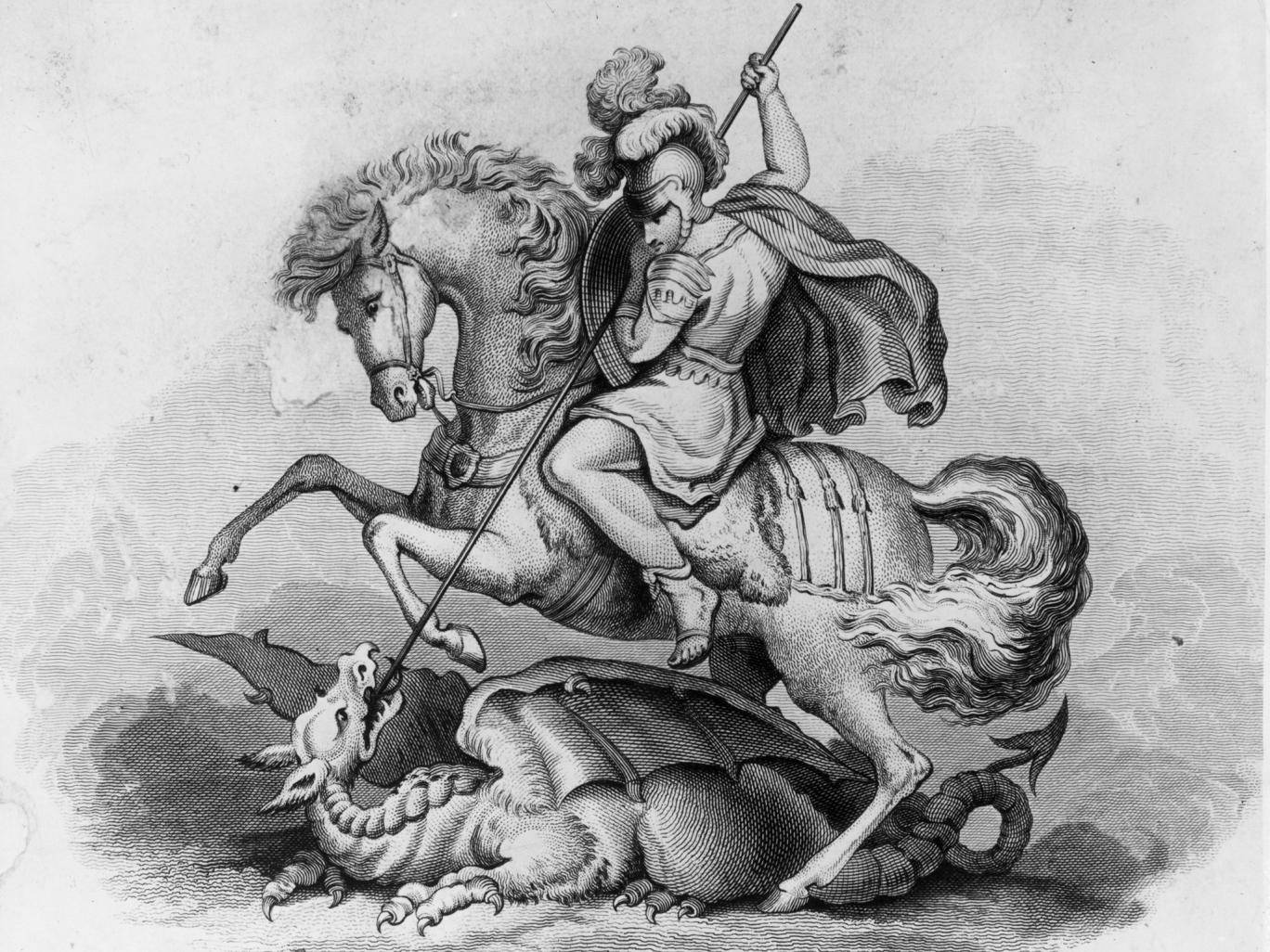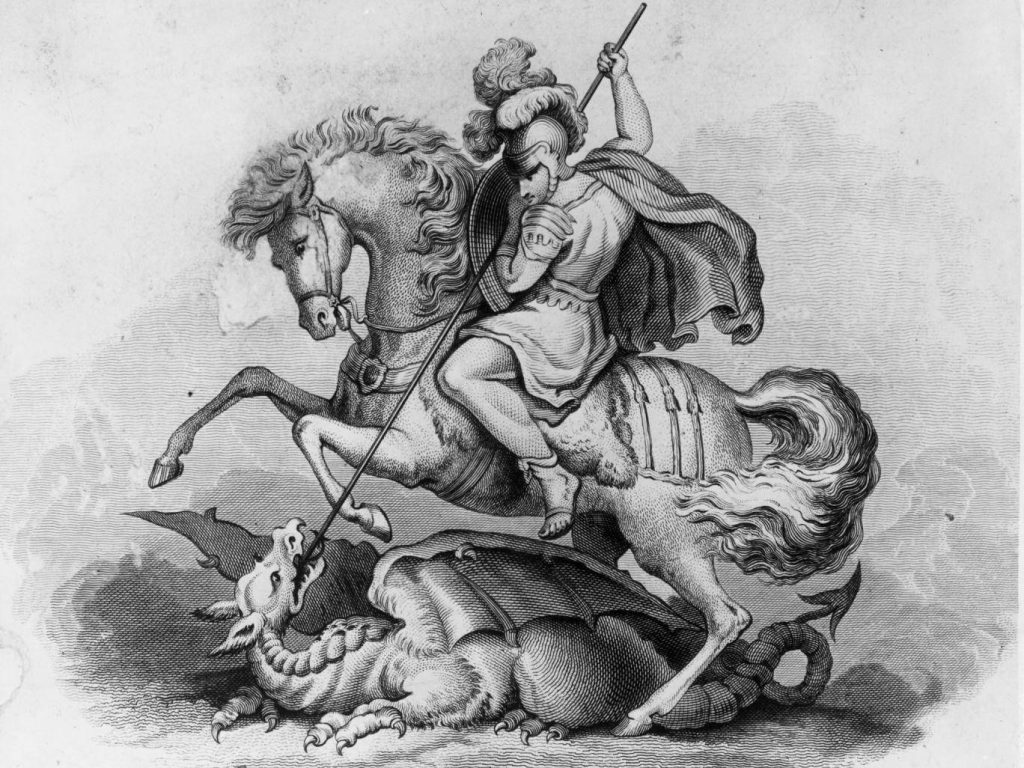The Tale of St George!
Posted on April 24, 2018
Wherever I looked yesterday, be it on Facebook or on Twitter, there seemed to be people getting irate about St George’s day, which always confuses me. Why get angry about being English?
Rather than posting a flag and saying “Happy St George’s Day everyone” I kept on seeing things about not being ashamed to be English, not caring what anyone thinks, or being “fucking English, whether someone else likes it or not”.
Instead of being a jolly day of fun and games, right wing loons seem to have made St George’s Day some sort of racist badge of honour. I think this is a shame, as you don’t see Welsh, Scottish or Irish people being so verbally aggressive on their respective patriot saint days.
The Irish seem to embrace these days more than most but you don’t see them walking around saying “I’m fucking Irish and I don’t care what you think” or “Share this if you aren’t ashamed to be called Seamus”, so what on earth are some English people turning into?
Through both my day job and cricket, I meet a lot of different cultures and on the whole, they love English culture, whether it is country pubs, cricket on the green, duck ponds, village fetes, the quaint seaside resorts or the rolling hills and mediocre attempts at mountains. They only thing they seem to struggle with is why a country of such wealth and culture would feel the need to produce a Rich Tea biscuit.
They would enjoy traditional St George’s parties on the village green but sadly, nutters who claim that foreign people want to turn the village Post Office into a mosque, have hijacked anything they can about English culture and used it as a tool to vent their insecure and moronic spleens.
When I have been travelling across these Isles and Europe over the last few years, I have been saddened that whilst England goes backwards, most countries I have visited such as Germany, Greece, Italy and Ireland, have managed to grow in stature by being proud of their own culture whilst embracing the sometimes rocky road towards a bigger and more inclusive future where freedom of movement and expression enhances everyone culturally.
Sorrento in Italy is a great example. Italian culture endorsed by a European outlook.
So who was St George?
According to legend, St George was a Roman soldier born in what is now modern-day Turkey in around 280AD. He died around 303. Details about his early life are at best patchy but it is believed he was born to a rich and respected Christian noble family, latterly becoming a soldier, joining the retinue of Emperor Diocletian.
It all started going wrong for St George in 303 when Diocletian, as part of a cull of the Christian community, demanded all Christian soldiers in the army should be expelled and all Roman soldiers be forced to make the traditional pagan sacrifice.
St George refused and denounced the edict in front of his fellow soldiers, declaring he was a Christian. Diocletian initially tried to convert him with offers of money and land but he refused so, as was pretty standard in the good old days, they lopped off his head on or around the 23rd of April 303.
There is little evidence that he ever visited England, not even for a holiday or to beat up some Pakistanis and there is also very patchy evidence regarding the slaying of a dragon.
Call me Mr Picky but the following information is a little bit far-fetched. However, stay with it and form your own opinion.
So what happened was there was a small town in Libya you see and it had a small lake with a plague-infected dragon living in it. The local folk were, one by one, getting killed by the dragon, so to appease it; they fed it two sheep a day to keep it off their backs.
Tragically, they ran out of sheep, so the king, who couldn’t have been a very nice chap, came up with a lottery system to feed it local children instead. As proof that sods law is as ancient as St George, one comical day, his own daughter was drawn out of the hat. Can you imagine the king’s face?
Still, being a man of honour (albeit dubious) the king offered up his daughter whilst down at the lake, the dragon licked his lips, or threw a flame, or whatever it was dragons did back in the day.
Then at the last minute, you’ll never guess who trotted by? Only St George on horseback, complete with a sword and a masterplan to solve a whole host of issues with the dragon and the religious folk of the village.
His deal to the locals was an offer to slay the dragon if they all converted to Christianity, but it had to be right then with no messing about saying that they would do it later when they had the time to fill the forms out.
After a lively meeting at the local Parish Hall, they all finally agreed to be Christians, the king built a church where the dragon died and everyone lived happily ever after, although it’s not know whether the relationship between the king and his daughter ever really recovered.
Such was his popularity after this event, as well as back here in blighty, St George went on to become the patron saint of Portugal, Venice, Beirut, Malta, Ethiopia, Georgia, the Palestinian territories, Serbia and Lithuania as he embodied the characteristics these kingdoms wanted to project to the outside world.
I wonder what (if he existed) St George would have thought about being hijacked by a bunch of cretins who seem to spend their lives worrying about how other folk perceive how patriotic they are? So worried they feel compelled to get aggressive about it on social media accusing anyone who isn’t a cretin of being a traitor and offering to punch a bacon sandwich down their throats.
My guess is that St George would have probably thought they were a right bunch of cunts.


Got something to say?